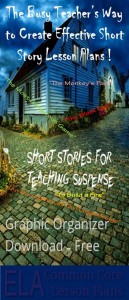I was feeling pretty good about myself after having taught some great short stories with examples of foreshadowing. So good, in fact, that I took down all the pictures of the teachers of the year since 1993 that were hanging in the hallway leading to the principal’s office at my school and replaced them with pictures of myself dressed as Ms. Havisham from Great Expectations.
Full of confidence, I decided to take teaching foreshadowing to the next level by teaching suspense and creating an awesome graphic organizer handout for teaching suspense. I got fired the next day and never got to use it, but 7 of the previous 8 teachers of the year at my school used it and said it was awesome.
Here it is: Suspense in the”Most Dangerous Game” chart.
It’s a word document, so you can edit it to fit any story you read that involves suspense.
Here’s a list of 8 stories involving suspense that I taught before getting fired for going Flavius and Marullus on the teachers of the year at my school.

Preparation is the foundation for effective teaching. Don’t waste another second. These short story lesson plans come with graphic organizers, rubrics, quizzes, answer keys, and more. They’re student ready. They’re teacher ready. All you need to do is download the pdf and make copies. You get a 5-7 week short story unit (5 complete short story units). That’s 5-7 weeks of doing what’s really important: teaching!
"An Occurrence at Owl Creek Bridge" by Ambrose Bierce. Although there is a goodly amount of dangerous action--getting hanged from a bridge while being guarded by gun-toting soldiers lends itself to danger--and a tad bit of foreshadowing, the predominant method for creating suspense in "An Occurrence at Owl Creek Bridge" involves pacing. Considering how Bierce manipulates time to reinforce one of the story's major themes, using pacing to create suspense makes perfect suspense sense.
"The Lady or the Tiger" by Frank Stockton. Since we're on the subject of pacing, Stockton wins. In fact, we still don't know what door the young man opens--the one hiding the hottie or the one hiding a tiger in the mood for mauling.
"The Monkey's Paw" by W.W. Jacobs. Other than messing with Ender Wiggin, there's nothing more stupid than messing with the monkey's paw. There's a substantial amount of foreshadowing that indicates those who mess with the monkey's paw do so at their own risk. There's also a goodly amount of pacing. The monkey's paw has made an appearance at college football stadiums around the United States in recent months as well.
"The Cask of Amontillado" by Edgar Allan Poe. Technically, you could add any short story by Edgar Allan Poe to this list, but that would be kind of lazy. I, therefore, chose my favorite. We all know Montresor is getting revenge. We're just not sure exactly how he's going to accomplish it. In addition to masterful use of foreshadowing and pacing, Poe makes great use of irony and setting to heighten feelings of anxiety and apprehension.
"The Lottery" by Shirley Jackson. This is one messed up ritual. There are clues early in the story that winning the lottery isn't all it's cracked up to be, but Jackson makes the reader wait for the story's shocking ending.
"To Build a Fire" by Jack London. I remember when I was a kid and I had to go outside in the morning and it would get so cold that snot would freeze to my nostrils (the main reason I no longer live in Ohio). The narrator in Jack London's classic struggle between man and nature would have called that summer. It's freaking cold. And he has to build a fire. Like right now. London's pacing is masterful. His foreshadowing provides the exact right amount of hints. The dangerous action is enveloped in the setting. It's enough to make your blood freeze (see what I did there).
"A Sound of Thunder" by Ray Bradbury. "Don't step off the path!" "Don't step off the path!" "Don't step off the path!" "Don't step off the path!" "Don't step off the path!" "Don't step off the path!" Of course, Eckles steps off the path, which is actually more dangerous than hunting T-Rexes.
Last Updated on December 6, 2016 by Trenton Lorcher
Share This: